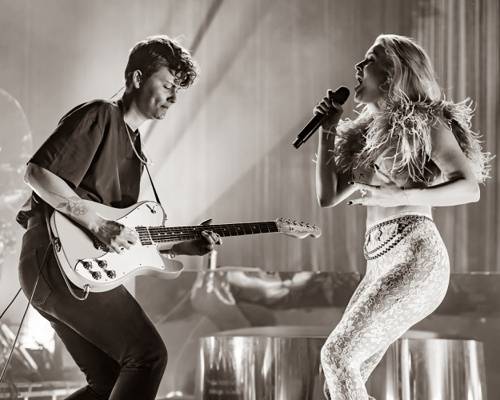
FAQ About The Role of Pop Music in Social Movements

What is the role of pop music in social movements?
Pop music plays a significant role in social movements by providing a platform to spread messages quickly and widely due to its broad appeal. It often captures the essence of the movement, translating complex issues into relatable and emotive language. Artists create songs that resonate with people's emotions, catalyzing change and raising awareness about various social issues.

How has pop music historically contributed to social change?
Throughout history, pop music has been a tool for social change. During the civil rights movement, songs like "A Change is Gonna Come" by Sam Cooke and "Respect" by Aretha Franklin served as anthems for equality and empowerment. In the 1980s, Band Aid's "Do They Know It's Christmas?" and USA for Africa's "We Are the World" addressed global poverty and hunger, showing pop music's capacity to inspire humanitarian action.

Can pop music influence public opinion and policies?
Yes, pop music can influence public opinion and policies by bringing light to issues and mobilizing public action. When songs address social or political issues, they can engage listeners emotionally and intellectually, prompting discussions and sometimes sparking policy changes. For instance, protest songs have historically contributed to anti-war sentiments and have been part of larger advocacy strategies to effect change.

What are some examples of pop songs that supported social movements?
Examples of pop songs that supported social movements include "Imagine" by John Lennon, which envisions a world of peace and unity, and "Born This Way" by Lady Gaga, which has become an anthem for LGBTQ+ rights. More recently, Beyoncé's "Formation" has been celebrated for addressing issues of race, feminism, and empowerment, supporting the Black Lives Matter movement.

How do artists use pop music to support social causes?
Artists use pop music to support social causes by writing lyrics that address social injustices, performing at benefit concerts, and using their platforms to raise awareness. They engage their fan base by promoting charitable causes and often collaborate with activist groups to amplify their impact. These efforts help bridge the gap between entertainment and activism, making it easier for listeners to engage with the issues being highlighted.

Why is pop music effective in driving social movements?
Pop music is effective in driving social movements due to its accessibility, emotional resonance, and ability to unite people across different demographics. Its catchy melodies, relatable lyrics, and broad dissemination through media make it a powerful vehicle for conveying messages. Additionally, pop music's universal appeal helps it cross cultural and social barriers, making it an effective tool for rallying support and inspiring action.

Can pop music help sustain a social movement long-term?
Pop music can help sustain a social movement long-term by keeping the issues in public discourse and maintaining momentum through continual engagement. Songs that become anthems for a cause aid in preserving the movement's ideals in the public's mind, motivating ongoing activism. Moreover, new music contributes fresh perspectives and renewed energy, encouraging both participants and new supporters to remain active in the movement.

What are some risks associated with using pop music in social movements?
Some risks associated with using pop music in social movements include commercialization, where the original message may be diluted or misconstrued for profit. There's also the potential for superficial engagement, where individuals support the cause only while it's trending, leading to temporary rather than lasting impact. It is essential for music supporting social movements to maintain authenticity and depth to avoid trivializing the issues at hand.

How do different cultures incorporate pop music in their social movements?
Different cultures incorporate pop music in their social movements by infusing local musical styles and instruments to resonate with their audiences culturally. In Latin America, for example, pop music may blend with traditional rhythms to address issues like political corruption or inequality. K-pop artists have also increasingly incorporated themes around mental health awareness and social justice, reflecting the unique challenges faced within their cultural contexts.

Has digital media enhanced the role of pop music in social movements?
Yes, digital media has significantly enhanced the role of pop music in social movements by expanding its reach and facilitating rapid dissemination of music. Social media platforms, in particular, serve as conduits for viral spread, allowing songs related to social causes to quickly gather a global audience. Additionally, streaming services have enabled easier access to politically and socially charged music, empowering users to discover and share songs that resonate with their values.

Are there any criticisms of pop music's involvement in social movements?
Critics of pop music's involvement in social movements argue that it can lead to the oversimplification of complex issues, making them appear superficial and potentially diverting attention from serious activism. Additionally, they point out the risk of "slacktivism," where individuals might feel they have contributed to a cause simply by consuming a song or sharing it online, rather than taking substantial real-world actions.

Do all social movements use pop music effectively?
Not all social movements use pop music effectively, as effective use requires genuine engagement with the movement's goals and careful crafting of messaging. Some movements might struggle with gaining the necessary support or media attention. However, when aligned well, pop music can significantly amplify a movement's voice and help capture the public's imagination, making it a powerful tool in the hands of those who know how to harness it.

What impact does pop music have on youth engagement in social issues?
Pop music has a significant impact on youth engagement in social issues by speaking to younger audiences in a language they understand and enjoy. Artists who infuse their music with social messages can inspire a sense of empowerment and agency among young listeners, often leading them to explore deeper involvement in the issues. By associating social causes with popular and influential figures, youth are often encouraged to participate in social movements and advocacy.

How do streaming services affect the role of pop music in social movements?
Streaming services have a profound effect on the role of pop music in social movements by democratizing access to music and enabling artists to independently release songs addressing social issues. These platforms enable rapid sharing and wide-reaching exposure, making it easier for songs tied to social causes to reach a broad audience. They also help track what resonates with listeners, providing insight into public interest and engagement with social topics.

What are some recent examples of pop music impacting social movements?
Recent examples of pop music impacting social movements include Childish Gambino's "This Is America," which addresses issues of gun violence and racism in the United States, and H.E.R's "I Can't Breathe," which highlights racial inequality and police brutality. These songs have sparked conversations and provided soundtracks for protests, demonstrating how contemporary pop music continues to play a critical role in advocating for change.

How do pop music festivals support social causes?
Pop music festivals support social causes by featuring activations that promote awareness, raising funds, and providing a platform for advocacy groups to engage with attendees. Festivals may partner with nonprofits or social organizations to focus on issues ranging from environmental sustainability to human rights. By leveraging the popularity and attendance of festivals, these events can effectively draw attention to and encourage positive action on social causes.

What is the significance of lyrics in pop music's role in social movements?
Lyrics are crucial in pop music's role in social movements as they convey powerful messages and evoke emotional responses. Thoughtful and meaningful lyrics can articulate the values and demands of a movement, resonate with listeners, and inspire action. By addressing themes of justice, equality, and change, lyrics help translate the abstract concepts into personal, relatable stories that encourage deeper understanding and empathy.

Can pop music trivialize social movements?
Pop music can sometimes trivialize social movements if the messaging lacks depth or is seen as a marketing ploy rather than a genuine advocacy effort. When artists or the industry prioritize commercial success over authenticity, they risk reducing complex social issues to mere trends. It's vital for pop music supporting social movements to reflect genuine commitment to the cause to avoid undermining the movement's integrity.

What role do pop music videos play in supporting social movements?
Pop music videos play a pivotal role in supporting social movements by visually representing and enhancing the song's message. They can provide powerful imagery that raises awareness and deepens understanding of social issues. Videos often incorporate symbolic visuals, narratives, and real-world footage that amplify the impact of the song, offering an engaging way to attract attention and generate discussion around social causes.

How do collaborations between artists and activists strengthen the impact of pop music in social movements?
Collaborations between artists and activists strengthen the impact of pop music in social movements by combining artistic influence with grassroots organizing expertise. These partnerships allow for more informed messaging, broader reach, and greater resource mobilization. Artists can lend their platform to activists, amplifying their voices to much larger audiences, while activists ensure the music accurately reflects the movement’s objectives and ideals.
